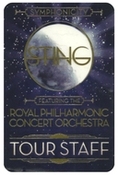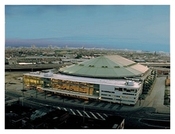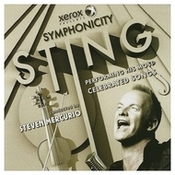
Sting at Sportpaleis...
Anyone who still dares to say that the Sportpaleis is unsuitable for fully embodying the subtleties of a symphonic performance, we must unfortunately disagree. The sound engineer for Sting's 'Symphonicity' Tour did indeed spend four hours during the technical rehearsal getting everything set up correctly. He also measured the sound in the various bends of the Sportpaleis, the blind spots. We were seated on the left bend, a blind spot, on the first floor.
The last time Sting and a symphony orchestra performed at the Merksem concert hall was in 1993. Back then, he was on the Night of the Proms program. Around 8,000 spectators witnessed his Symphonicity performance, which consisted of two parts, with a surprising number of well-known works at the very beginning of part one. After the intermission, a gourmet menu was served. A combination that surprisingly worked.
Sting opened with "If I Ever Lose My Faith In You." It wasn't going to be a stiff performance, though. The audience sang along to "I oho" during "Every Little Thing She Does Is Magic" while he pounded out the rhythm on Beatring. Sting settled in at the piano when the clarinet took a beautiful solo in "Englishman in New York," where, just like on the album, the instrument dictates the timbre. "Be Yourself," Sting sang, while the audience took to "No Matter What They Say."
"Roxanne" gains sadness with its cello accompaniment and has a Southern feel with Sting's Spanish guitar. According to the singer-songwriter, there are two ways to write a love song. You can write: "I love you and you love me." Or "I love you and you love somebody else." The latter, according to Sting, is much more interesting because it involves pain. The beat taps along with discipline during the beautiful "When We Dance," which, despite the singer's sharp s-sounds and the vocals with backing vocals that blend only slightly, more than holds its own. Sting sang with a silver retro microphone, which allowed the sharper tones in his voice to be less filtered. Later, the vocals with his backing vocals would blend much better, for example, in "Whenever I Say Your Name." "Russians" is about the Cold War and has a more menacing, militaristic arrangement with plenty of drums, strings, and brass, which swell the sound even further halfway through the song. Sting notes that he enjoys Western series from the 1950s and 1960s. He counts "Bonanza" among his favourite shows of that genre and era. He plays "I Hung My Head" on harmonica. The singer also partially transitions the song into acting, pretending to hold a shotgun and aiming it skyward. "Shape of My Heart" is another highlight, with guitars, strings, brass, and piano, all of which we hear very clearly. The song ends with harmonica.
The singer talks at length about how some songs originated. He mentioned, for example, that his father wasn't very talkative back then. However, Sting did remember a walk to the river with his dad. He once pointed out the boat sailing on the river. "I want you to go to the sea," he'd said. Only later did the songwriter realize what his father had meant: "Live an exciting life." "Of course I let him down," Sting joked, adding that he once literally applied his dad's advice. "I once performed on a cruise ship. I hated it," he said. He wrote "Why Should I Cry For You?" for his deceased father.
Sting dedicated "We Work The Black Seam" to the 33 Chilean miners who have been trapped underground since August 5th following an explosion in a mineshaft. All 33 miners have seen daylight again in the past and coming hours, after being brought up one by one via a special elevator. Sting proved he had a fine voice. The verse of the song is quite jumpy in terms of notes. The xylophone was perfectly audible.
The only song that didn't quite make sense was "Next To You," just before the intermission, where Sting achieved an Elvis-like effect on his voice. The orchestra and band tried to rock out, as they did back then, but this experiment resulted in a chaotic jumble of sounds.
After the break, Sting explained that when he writes songs, he sometimes starts with the lyrics, sometimes with the melody. For "Tomorrow We'll See," he had already established the musical details. Only later did he realize that the song was supposed to be about a male transsexual prostitute. Although he initially refused to admit what came to mind at that moment, he realized that as a songwriter, you sometimes have to step into someone else's shoes, to see the world through their eyes. The man shows the red lining of his vest and says he's never seen a vampire. But on the French Corner in New Orleans, he sometimes felt like he was being followed. Visuals of a full moon and a mysterious arrangement for strings, oboe, and piano, among other things, accompany "Moon Over Bourbon Street." An effects device is also used where you can make it emit different frequencies by shaking your hand in the air around a transmitter. It gave the already mysterious atmosphere a very eerie quality. Sting also briefly sang a cappella to end the song by imitating a werewolf.
He introduced "End of the Game" by recounting how a fox once killed all his chickens, while "You Will Be My Ain't True Love" was written for the film "Cold Mountain" starring Nicole Kidman and Jude Law. His impeccable sound is once again evident during "All Would Envy," where we hear the harp effortlessly blend with the rest of the symphony orchestra. The Bible's "Samuel 2, Chapter 11" inspired Sting for "Mad About You." In the biblical story, David eliminates Uriah the Hittite by deploying him to the army at a vulnerable point against the Ammonites. David has slept with his wife Bathsheba, and she has become pregnant by him. God is displeased and punishes David for this murder. Clarinet and brass then make their presence felt in the symphonic version of "Mad About You."
The volume then rises, and "King of Pain" and "Every Breath You Take" elicit foot stomps and a well-deserved standing ovation after a performance that deserves to be framed. Sting will then return three more times for the oriental-influenced "Desert Rose," for which we find in our notes: "What an orchestration!" The clocks tick as the intro to "She's Too Good For Me," accompanied by black-and-white photos of divas. The song is a bit too repetitive for our taste. Sting's guitar is allowed to soar above the strings during an intimate version of "Fragile." It's a shame the brass section waves along with white flashlights. If any song isn't meant to be a sway-along moment, it's "Fragile." The mature audience doesn't participate either: thankfully, cell phones are left out. Sting closes the performance a cappella with "I Was Brought To My Senses."
This was by far the richest sound palette we've ever experienced from an artist at the Sportpaleis. Sting dared to take risks by choosing unconventional orchestrations. Some melodies were revisited and reinterpreted in a more idiosyncratic way. It was a rediscovery of existing songs. Sting sang perfectly. A three-star performance? You bet! And a nomination for Best Live Performance 2010-2011 on top of that. Did we mention, by the way, that our bar is even higher this season than last?
© Concertnews.be by Bert Hertogs
10132010
SET LIST
- If I Ever Lose My Faith In You
- Every Little Thing She Does Is Magic
- Englishman In New York
- Roxanne
- Straight To My Heart
- When We Dance
- Russians
- I Hung My Head
- Shape Of My Heart
- Why Should I Cry For You?
- We Work The Black Seam
- Whenever I Say Your Name
- Fields Of Gold
- Next To You
- A Thousand Years
- This Cowboy Song
- Tomorrow We'll See
- Moon Over Bourbon Street
- End Of The Game
- You Will Be My Ain True Love
- All Would Envy
- Mad About You
- King Of Pain
- Every Breath You Take
- Desert Rose
- She's Too Good For Me
- Fragile
- I Was Brought To My Senses





